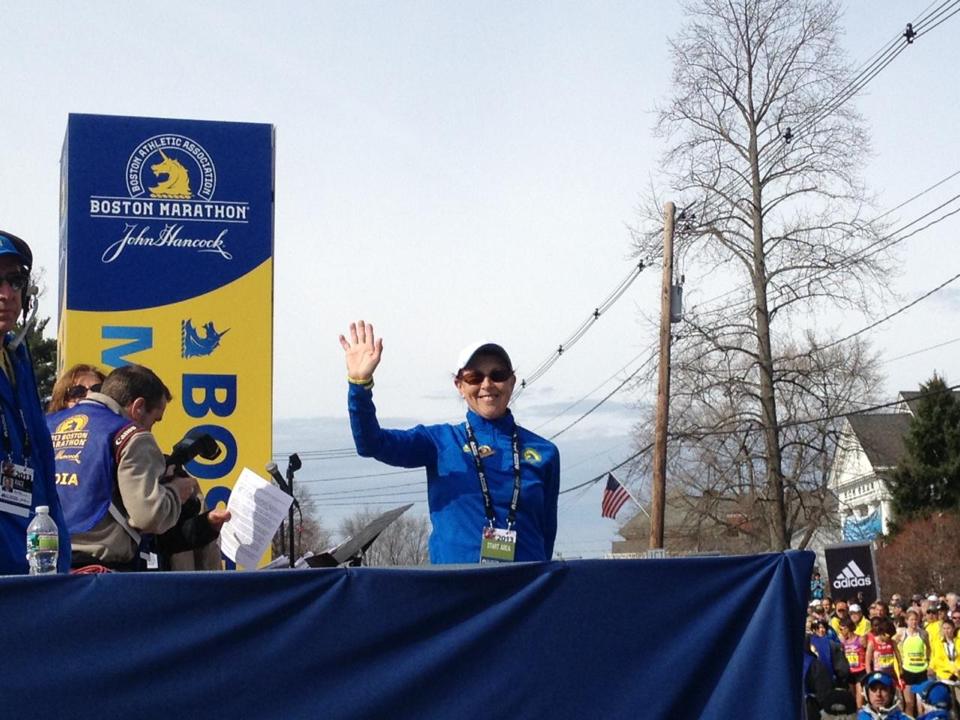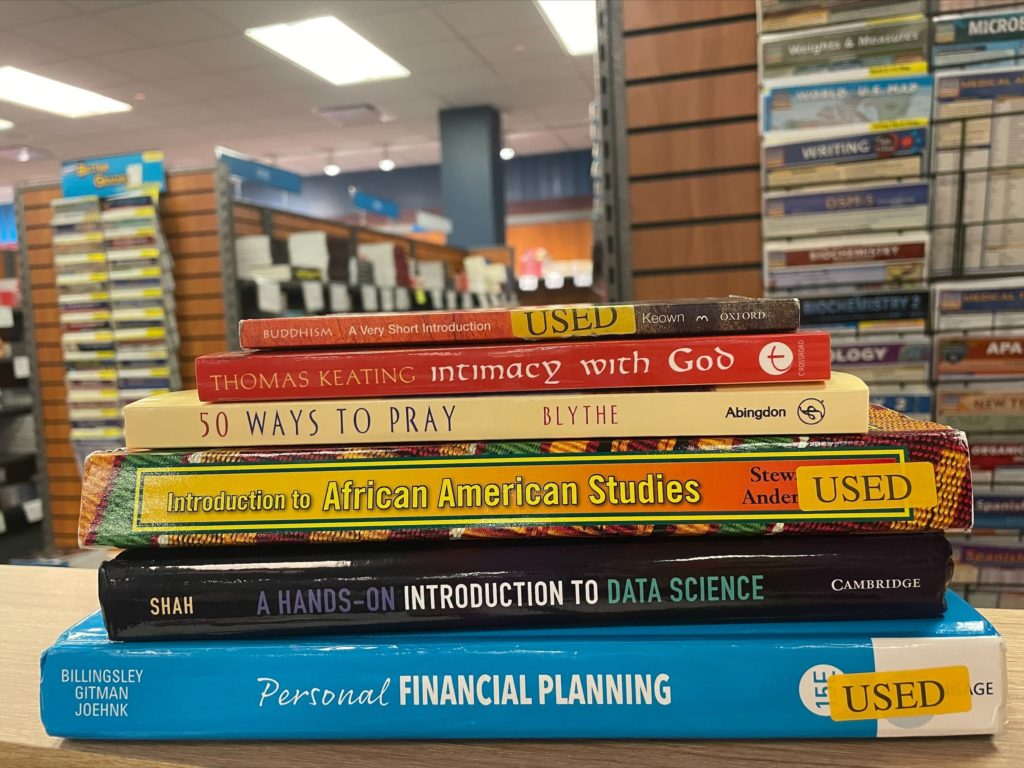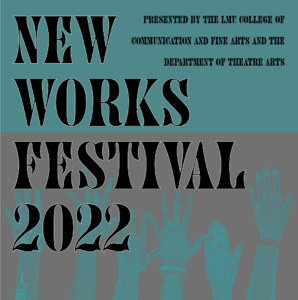CONVERSATION | Jacqueline Hansen, program coordinator and lecturer for the School of Education, made a name for herself as a champion long-distance runner and activist for women athletes. As she describes it: “I was a child of the ’60s, a feminist of the ’70s, a soccer mom in the ’80s, and in the ’90s I actually had to work for a living.” Hansen is the author of “A Long Time Coming: Running Through the Women’s Marathon Revolution.” She talked with LMU this Week about her experiences.
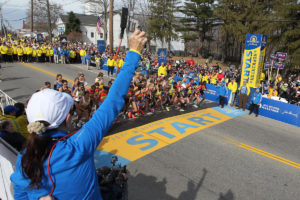
Jacqueline Hansen: I grew up before running was this popular, when marathons were not a parade of tens of thousands. Everybody in the running community knew each other, and everybody knew your name. So, all the legends of running were like a club. We’re on a first-name basis and we still get together. And other people just wished they knew people like that; they wished they had lived in a world like that.
And I’ve spent all my time giving back to the sport that gave me so much.
LMU This Week: They’ve been writing about you for several decades; are there qualities that make for success in running that translate to life?
JH: So many; you learn so many life lessons in running. I would say that’s true for all sports, but to be specific about long-distance running, you really learn discipline, commitment, determination and sacrifice. And focus – you have to have endurance. All of those factors have helped me in life. I cannot tell you how many times a week I will say, “Thank God I’m a marathoner.” I’ve been through some adversity, and it does get you through the hard times. It helps you persist in the challenging times, when you’re overworked or overwhelmed. My coach used to like to say that I was the most stubborn runner he ever knew. I prefer the word determined.
LTW: You have won a lot of races, you’ve had a great deal of success; have there been races you haven’t finished? How did that factor into the course of your career?
JH: I’ll tell you that I began as a miler. When I was in Granada Hills High School, for example, I was introduced to track and field in my senior year, my last semester of my senior year. I was pretty bad at all other sports, but track and field has a place for everybody, all shapes and sizes, all kinds of talent. I didn’t have any success in high school and yet I fell in love with running; it didn’t matter if I raced or whether I qualified for anything, I just fell in love with running. As I progressed, and I was allowed to run longer – the longer I ran the better I got – I still consider the mile my favorite race, but I was a mediocre miler, too. Granted, I won a collegiate national championship at that distance. As a master in my last race – that’s the age group for when you turn 40 – I won a world championship. It was also a mile. I’m pretty good in my age groups, but as an open runner I never made a national team. I never won one major title in the mile. I was a much better marathoner; I won 12 out of my 15 marathons, including Boston, and including two world records. So, obviously I decided I was a marathoner.
LTW: Tell us your Olympic story.
JH: I learned very quickly that I didn’t have the opportunities in marathon that I had as a miler. I couldn’t make an Olympic team because the Olympics only allowed women to run as far as the mile. That only happened in 1972 for the first time. I’m only a world-record holder, and never an Olympian, because they didn’t have my distance. But I had a hand in changing that. I’m more proud of that than any world record. As president of a committee of 13 people – I need to give credit where credit is due – the International Runners Committee lobbied the International Olympic Committee and ultimately sued, and sued all the federations on down. So, there’s that quote, my favorite quote: “Don’t doubt what a small group of people can do to change the world. Because indeed, that’s the only thing that ever has.” That was us.
It was the International Runners Committee and all the people we represented from our various communities, that we worked on getting women’s distance events in to the Olympic Games. Sure, I started out selfishly, thinking that I’m No. 1 in the world for three years running, the Olympics are coming, if we get that job done and I’ll get to be in the Olympics. It didn’t happen; it took 10 years. But I did qualify for that very first Olympic trials – at 36 years old with a 4-year-old child – it almost killed me. But I had to be on that starting line. I didn’t make that Olympic team, of course, but my dear, good, best friend Joan Benoit did. She stayed with me during the Olympics; at least that gold medal that I didn’t get to chase was in my house. And she said thank you. That’s my Olympic story.
I know you asked me if there were races I wish I could have won, or wish I had finished – there are races I wish I could have started. I wish I could have started that Olympic marathon. I became very bitter and disillusioned about the Olympics in the process, because it’s so political and it’s so discriminatory. I was treated very badly in a lot of situations, during the whole series of court appearances. I tell you: you persist. Watching Joanie win that marathon here in L.A. in 1984, I realized there’s a whole generation behind us that deserves the right to go to the Olympics if they want to. So, yeah, it was worthwhile. There’re just some things you do even if you’re not going to benefit individually, you just do them because it’s the right thing to do.
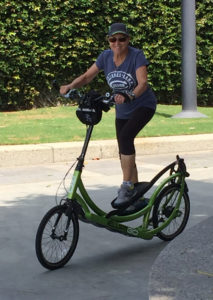
LTW: Why did you pick LMU for grad school?
JH: Because I like their theme of social justice, you can see why. Justice speaks to me. That word, that theme speaks to me; that’s my mission. I’m in a whole little world of women, you know, runners, but it’s justice.
LTW: Do you continue to run? Are you still coaching high school runners?
JH: I coach all over the place, but my knees are toast. So, the way I keep up with my runners is I ride an ElliptiGo – an elliptical pedal bike. I coached at St. Monica’s, St. Bernard’s, Notre Dame Sherman Oaks – I’ve almost always been attached to a high school team. I think that’s probably because that’s where I got my start.
